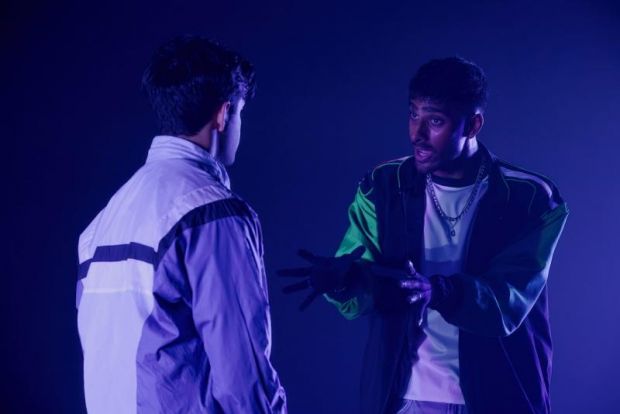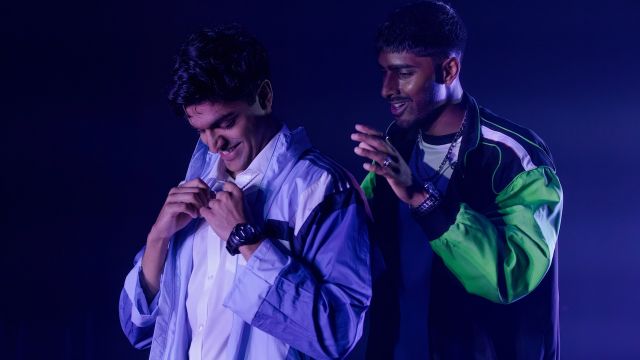Daytime Deewane
British playwright, poet and actor Azan Ahmed remembers his father’s stories of the daytime raves in England in 1980s and 90s where young South Asians came together to escape strict family rules and the discrimination practised at night clubs. He recalls “Tales from my Baba’s teens, him cutting up the dance floor at 90s Daytimers. My aunts and uncles had similar stories … of young 2nd generation British Asians cultivating their own genres of music, fashions and slang which blended their identities.”
 Ahmed used those happy memories to write a play “with racial brown joy in mind”. The result is an exceptional piece of theatre that celebrates family values and connection and freedom. He mixes poetry, rap, music, dance and drama to introduce two young Muslim boys in Britain at the end of last century – “two cousins on the cusp of adulthood who try to hang on to each other despite the heavy hands they have been dealt”.
Ahmed used those happy memories to write a play “with racial brown joy in mind”. The result is an exceptional piece of theatre that celebrates family values and connection and freedom. He mixes poetry, rap, music, dance and drama to introduce two young Muslim boys in Britain at the end of last century – “two cousins on the cusp of adulthood who try to hang on to each other despite the heavy hands they have been dealt”.
Sadiq is 22. He’s a law student fulfilling the dreams of his father. But he’s dropped out and moved on to other things …
Farhan is his cousin. He’s 16, a Grade A student who spends hours each night helping fill in the forms that will avoid his father being deported.
The boys are close. They played together as kids. To Farhan Sadiq is a bit of a hero.
Sadiq has invited Farhan to the final day of the local Daytime club, ostensibly to celebrate his birthday with a special present – which, for religious and legal reasons Farhan refuses accept, even though it might help hire a lawyer for his father.
Themes of loyalty, trust, unrealistic expectations and love interweave as the boys reach toward each other – and push each other away – in a hazy atmosphere filled with Bhangra fused dance music (designed and composed by Chrysoulla Markoulli) and flashing light effects by Brockman.
There is laughter and warmth in this play, tension and tears, loud music and deft dance moves. It’s a melting pot of messages that are heart-warming and enriching. Sadiq and Farhan could be any young people making their way in a country other than their own, trying to balance different cultural and social values and expectations.
Ashan Kumar is a very wired and jumpy Sadiq. Kumar is tall, athletic, energetic, light on his feet. The Sadiq he creates is out-going, cheeky, reaching into the “Daytime crowd” – the audience – with poetic rap, physicality and mischievous comments as he explains why it’s important that his up-tight cousin experiences this loud, very culturally incorrect scene.

Ariyan Sharma plays teenage Farhan as hesitant, studious, responsible. It’s only his loyalty to his cousin that has convinced him to wag a Maths lesson! He makes Farhan contained, controlled, bound by his culture, his family, the implications of his father’s future – and shocked by the things he learns about his cousin.
Later, he takes Farhan through the next twenty years gradually gaining age, experience and the responsibilities of his own family. It is intriguing to watch the tiny changes in stance and movement and expression that change him from awkward schoolboy to mature husband and father.
Both actors have – with the assistance of dialect/voice coach Linda Nicholls-Gidley – perfected the accent and rhythm of the dialogue, keeping effective pace without losing the impact of the words or the poetry. They have also – with the adroit, empathetic direction of Sepy Baghaei – established a relationship that is unbelievably close.

Baghaei’s says “this slice of British-Asian history speaks boldly to contemporary Australia … especially at a time where some seek to sow division based on what makes us different”.
Daytime Deewane is about things that are important to all of us whatever our backgrounds – family, space, the freedom to grow and change, and be who we want to be.
Carol Wimmer
Photographer: Phil Erbacher
Subscribe to our E-Newsletter, buy our latest print edition or find a Performing Arts book at Book Nook.

